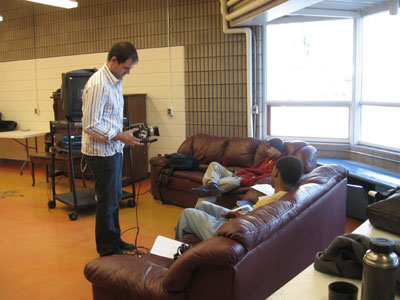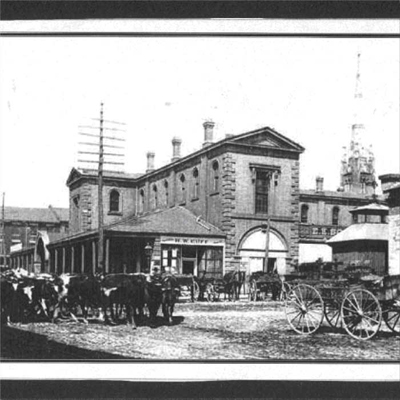Human transformation and progress towards a more positive enlightened way of living have long been topics that fascinate me. Many of the articles on this website focus on the personal transitions that so many of us go through. But not only do we as individuals go through transitions and change, but communities and cities also undergo transformations.
Following my trip to Mexico last year it became clearer for me than ever that my chosen home town Toronto is definitely one of the best places to live in, and I wanted to start an initiative to celebrate Toronto, a city that is often underappreciated and whose uniqueness and significance is overlooked by its own residents. For some reasons, we seem to collectively suffer from some sort of strange persistent inferiority complex here, wondering whether we are indeed a world class city or not.

Toronto: Are we a world-class city or not?
Well, I for one am a strong proponent of Toronto. As an immigrant woman and female entrepreneur I have personally seen the opportunities that this city can provide to people from all over the world, and my Celebrate Toronto initiative will encompass an extensive article series, photo exhibitions and neighbourhood portraits that will culminate in a big fundraising event later this year for the following project:
The “Outer Limits: International Youth Project” is a highly innovative program that was conceived by Kevin Lee and his staff at the Scadding Court Community Centre to help young people at a crossroads. In future years it will become a full-fledged anti-gang / anti-gun intervention program and will be carried out in partnership with Toronto Community Housing and India’s Durbar Mahila Sammanaya Committee near Kolkata. This Indian organization is a well-established non-profit agency that works toward a secure social existence and better life for sex workers and their families. Over the last few years the team at Scadding Court has raised close to $100,000 to built a residential school to provide training and educational opportunities for this group of children who represent one of the most marginalized and stigmatized segments of Indian society.
The most innovative part of this program is that the Outer Limits program will select youth from various low-income neighbourhoods in Toronto, take them out of their usual environments to teach English to the children in Kolkata. Located on a different continent in a vastly different environment from their own, the Toronto youth will have an opportunity to reevaluate their own lives in this new context, become involved in community service and undergo life-changing learning experiences. The ultimate goal of this program is to create a new generation of community leaders who will go back into their own neighbourhoods and plant the seeds of positive change throughout different marginalized areas all across Toronto. The Outer Limits: an international program with tangible local benefits.
The first group of four Toronto youth is scheduled to go to India on their international assignment on January 16 and they are planning to stay until April 12. For the last few weeks they have been receiving training on how to teach English as a Second Language, how to deal with culture shock and how to interact with the local children in India. They have also attended training for the creation of photo and video documentaries; and the group will be publishing their experiences on a blog throughout their entire stay in India. Last Thursday I made the trek to Scadding Court to catch a glimpse of the group’s training program, their preparation and their emotions as they prepare for this trip of a lifetime.

The videography workshop
When I visited the group was set up in a big classroom and studying how to use video equipment. I did not want to interrupt them so I pulled aside one the staff people to find out further information about the program. I ended up talking to Sarah Mair, a social work coop student from Ryerson University who is currently spending some time at Scadding Court helping with the Outer Limits project. She filled me in a little on some of the training that had already taken place: the program participants have been receiving training on how to teach English as a Second Language, how to speak basic Bengali, even how to cook Bengali cuisine. The participants have also been spending time learning photography and videography techniques in order to learn how to document their amazing experiences in India.
As I spent time talking with Sarah I realized that she is an interesting individual in her own right. As the daughter of Jamaican immigrants she has lived in different parts of Toronto, and as a person of colour she has had her own experiences with Toronto’s ethnic diversity. Sarah commented that she has had various key experiences growing up when she has witnessed or been at the receiving end of racial slurs. Sarah explained that especially during high school students tend to quite naturally segregate along racial and ethnic lines. She expressed that young people of colour often do not receive the same opportunities and found that her situation improved when she started attending a black-focussed school. An after school black-focussed program helped her develop a sense of pride and identity as a person of colour. Sarah added that persons of colour are often alienated by a Euro-centric curriculum, and towards the end of her high school years she noticed considerable tension among students of different backgrounds.
Based on her own experiences, Sarah has decided to make her own contributions to improving this situation, and through a career in social work she is planning to help marginalized individuals and people of colour. But she plans to go even further and move into the field of policy making and down the road might even consider politics, in order to make an active contribution towards creating more respect and tolerance for people of all backgrounds. She added that during a recent visit to a Toronto-area mall, a friend from Ohio commented on the astounding ethnic diversity in Toronto, a society unlike any other. In her and her friend’s opinion even New York City does not compare to the ethnic diversity that you see right here in Toronto.

Sarah Mair
Sarah feels very strongly about her desire to become involved in anti-racism and anti-oppression work. She wonders what makes us so silent and hesitant to bring about change, and plans to raise awareness for these issues. She mentioned that there are still many institutional problems with racism and it’s going to be a long road ahead yet to eradicate it, but fortunately there are many agencies in Toronto whose work is dedicated towards this cause and we are making progress.
Sarah’s passion impressed me, particularly when she explained that she has a severe hearing disability and during her childhood doctors had told her that she would never be able to talk. She added that due to her hearing disability, so many people have helped her in the past, and now she wants to become active to give back to the community.
The video workshop was taking a break for lunch, and this was my time to get to know some of the other players in the Outer Limits program. I had a chance to catch up with Shawn Thompson, a participant in the program who will be going to India in just a few days.
Shawn was born in Canada of Jamaican parents, and at 23 he is the oldest child in his family with a 21-year old brother and a 16-year old sister. He proudly talks of his brother who received a basketball scholarship to Tallahassee. With his brother out of the house, things are a lot quieter at home and he wonders how his sister will handle his three-month absence in India.
Shawn grew up in Toronto’s Kingston Road / Galloway Court area, locally known as a very rough area marred by drugs, prostitution and violence. As an insider, Shawn actually feels that the neighbourhood has gotten better. Despite recent improvements, the area still has a rough image and he mentioned that even police officers have more respect for you when you mention you are from that area.

Shawn Thompson
From 4 to 9 pm he works in a local community centre in an after-school drop-in program. Children age 6 and up as well as adults drop by for sports activities, to use the gym and the swimming pool. Of the children Shawn says that “these are kind of my kids”. He feels like a father figure and sometimes catches the kids imitating some of his unique sayings. He is very aware of the influence he has on these young people and is worried about what is going to happen to them when he leaves. Shawn wonders who is going to take over his mentor role in his absence.
He describes his communication style with the kids as very comfortable and says that these kids are his friends. Admittedly he has not had the best upbringing himself and often tries to do things differently from what he saw as a child. He goes on to say that he sometimes makes good-natured fun of the kids, but is never critical. His attachment to his charges becomes evident when he says that “these kids give trouble, but they are good kids, they are like “little men”.
It was only through a fluke that Shawn linked up with the Outer Limits project. He was going through a rough patch, problems in a personal relationship. He took two days off work and was going take a third day off when his supervisor phoned him and they started to talk about how Shawn’s life had been stagnating. Shawn admitted that he was going through a confusing time, and that was when his supervisor asked him if he would like to go to India.
Shawn recalls that he only ever had seen images of the Taj Mahal, his only exposure to India. His supervisor said he had two hours to make a life-changing decision, so Shawn talked it over with his mom who said “go – get out of the house”. Shawn still wasn’t 100% sure and waited until his supervisor called him back. They talked, Shawn was reluctant, saying that he needed more information. He met Kevin Lee, Scadding Court Community Centre’s Executive Director on a Saturday and Shawn started the preparation program just two days later on a Monday.
When asked about the program Shawn says that he finds it quite tiring since he is used to sleeping in for his afternoon job. It has taken some time to get used to the new routine, but the “people are good”. He added he really likes the school which has made learning very easy for him.
When thinking about India and his expectations, Shawn admits he doesn’t know what to expect of the poverty, the culture shock and the reverse culture shock that he might experience upon his return. He is a little worried because he takes things to heart and may start to resent it when people around here complain about things they don’t have when in reality they have so much.
Even just attending the training has changed him. The videography and photography training has been great, and he has really developed an idea of helping people. The training has made him aware of the abundance that he has, referring to his high school education, his job, his income. This project has allowed him to see that.
Shawn’s goal for his time in India is to just learn, not to impose. In a spirit of intercultural exchange he says “I want to give them what I know and take what they know”. He is planning to bring some of his music to show the Indian children what he and his friends listen to here. And he will bring video footage of Toronto to share his home town with them as well.

Shawn with Philip Maglieri
This young man spoke so calmly and eloquently and with a quiet conviction, and the few people who were in the room all commented on how touched they were by his statements. Philip Maglieri, the videography instructor, was in the room as well and had been filming Shawn as he spoke. He was next on my interview list.
Philip finished film school in 2000 and has been creating corporate and public sector videos over the last few years. Among other projects, he has completed a documentary on homeless Methadone patients, illustrating the problems that can arise when legal drugs are used for illegal means. He recently quit his job working with the Ministry of Finance and started working on a feature film which he isn’t ready to discuss yet.
Last summer Philip approached the Scadding Court Community Centre to offer video lessons and was taken up on his offer later in the fall. Philip’s goal is only to pass his knowledge on, he did not want to make the documentary himself. He is interested in the participants’ stories, but only if they want to tell them. His primary role will be to help put together the video footage after the trip for a documentary produced by the participants themselves.
Terry Smith has been accompanying the participants for the last few weeks. His responsibility has been to teach the young men how to teach English as a Second Language. Before Terry retired early from his position as a teacher with the Toronto District School Board he was working in a special program dedicated towards what he calls “hard-core non attenders”. Often these young people come from low-income neighbourhoods, have issues such as learning disabilities, low self-esteem, abuse at home, obsessive/compulsive disorder or anxiety issues.
In this role his approach was to work on the underlying problems, often this involved making referrals to the health care system or even the court system. Once these fundamental problems were addressed the students’ attendance returned to 100% in many cases. Students felt comfortable in the friendly non-traditional surroundings where classes were located at the Scadding Court Community Centre, and they enjoyed this non-judgmental environment. Often the role of these specialized teachers is to model behaviour such as conflict resolution or communication skills in general.

Terry Smith




